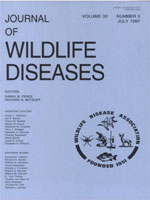We determined the prevalence and distribution of Jamestown Canyon (JC) virus antibody in white-tailed deer (Odocoileus virginianus) populations in Connecticut, USA. Sera were collected from hunter-killed deer during 1993. Antibody to JC virus was detected by enzyme-linked immunosorbent assay (ELISA) in 92 (21%) of 446 deer sera, and was uniformly distributed among geographic sites. Twenty-one ELISA-positive sera were tested and confirmed positive by plaque reduction neutralization testing. This represents the first serologic evidence of JC virus in a reservoir host population from the northeastern United States. No cross-reactivity was seen with California encephalitis, Keystone, or snowshoe hare viruses, but a varying degree of cross-reactivity was obtained with Guaroa, Jerry Slough, LaCrosse, San Angelo, and trivittatus viruses. We conclude from this investigation and previous isolations of JC virus from mosquitoes in the state that JC virus occurs enzootically in Connecticut.
How to translate text using browser tools
1 July 1997
Serologic Evidence of Jamestown Canyon Virus Infection in White-Tailed Deer Populations from Connecticut
Joann M. Zamparo,
Theodore G. Andreadis,
Robert E. Shope,
Shirley J. Tirrell

Journal of Wildlife Diseases
Vol. 33 • No. 3
July 1997
Vol. 33 • No. 3
July 1997
antibody
bunyavirus
California serogroup
enzyme-linked immunosorbent assay
Jamestown Canyon virus
Odocoileus virginianus
plaque reduction neutralization




